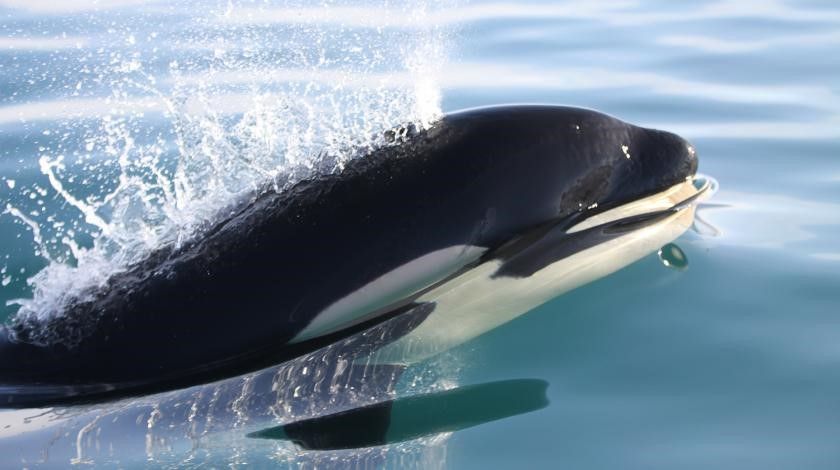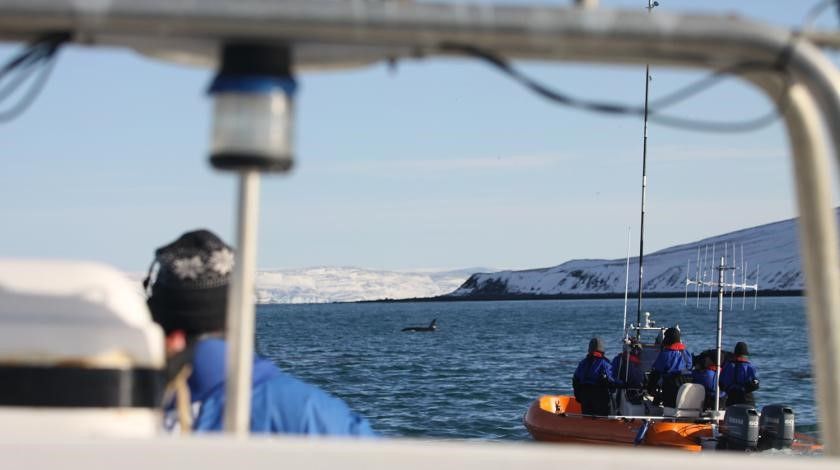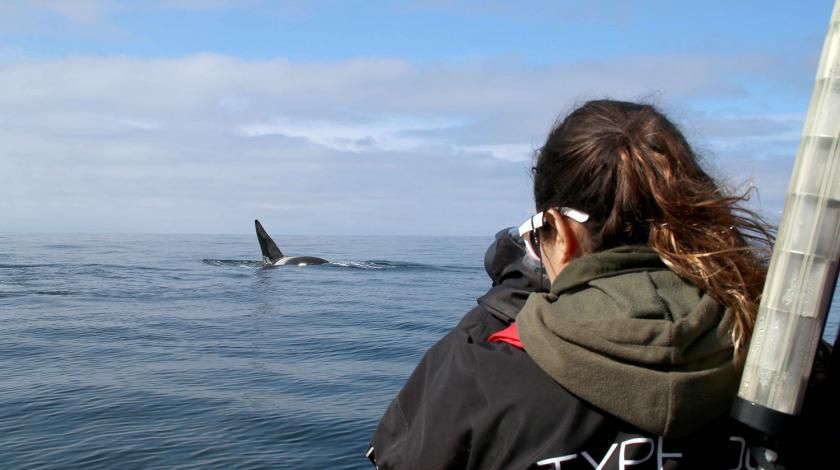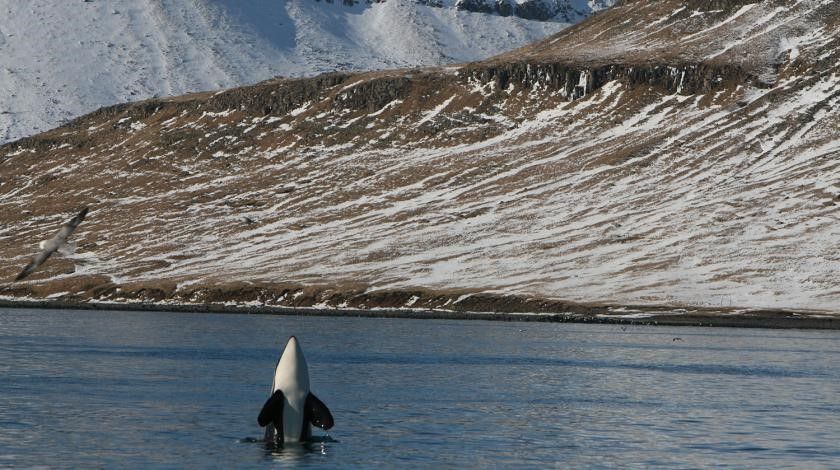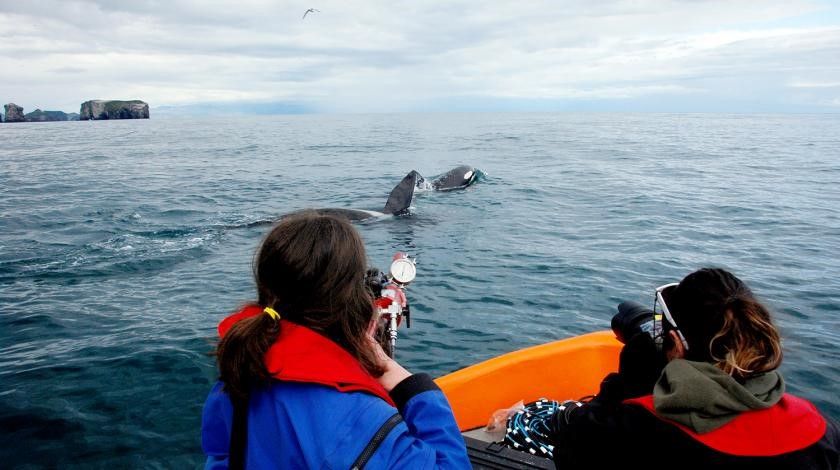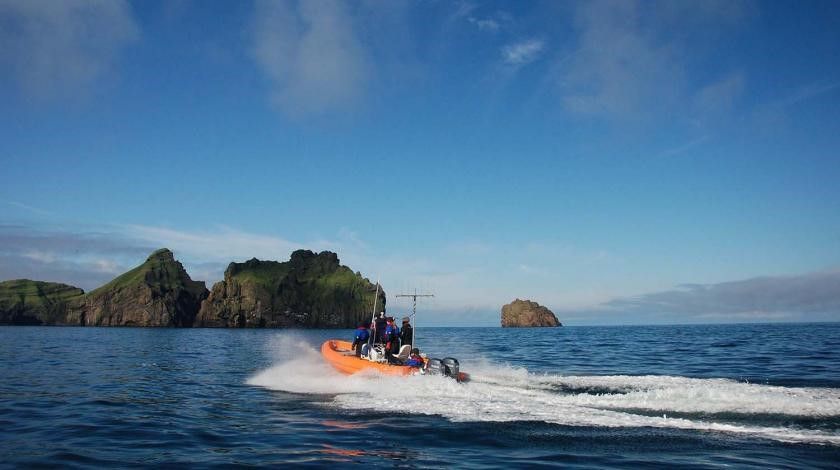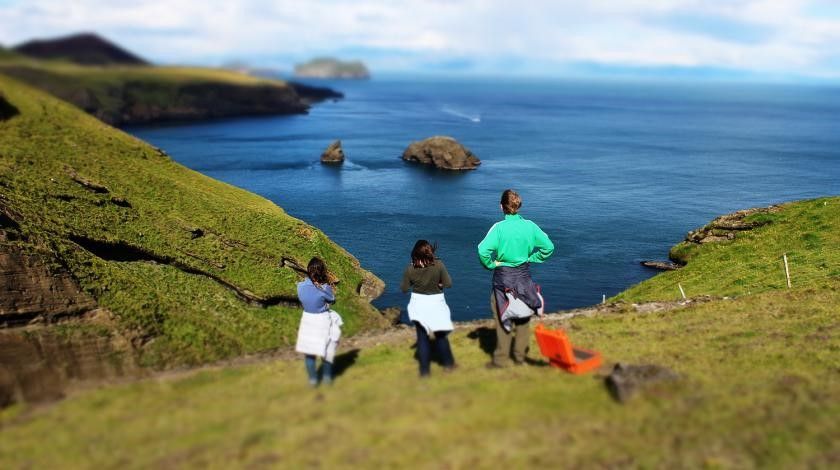Killer Whales and Their Prey in Iceland
Be part of the first long-term study to investigate the diet and behavior of Iceland’s killer whales, collecting information vital to protecting this important apex predator.
Scientists have very little information about the population or feeding patterns of killer whales (Orcinus orca) in Iceland. These animals play an important role in ecosystems – as top predators, they can affect the size of populations of prey species, which in turn affects the rest of the food chain. These interactions are known as trophic cascades and have the potential to reshape the environment.
Killer whale populations can vary considerably in terms of their feeding strategies, and they adapt these behaviors based on which prey are available. Some populations, for example, feed primarily on herring, while others feed on multiple species, including marine mammals such as whales and dolphins. Prey selection influences killer whale behavior, such as the way they form social groups, interactions between different animals, and their communication systems. Furthermore, prey selection can introduce other threats. For example, killer whales that feed on marine mammals or cod – species that are higher up on the food chain – are likely to consume higher levels of pollutants, which can affect their reproductive rates and the survival of their calves.
This is the first study in Iceland to assess the diet of killer whale populations in an effort to understand potential threats to the species. Data will be collected through observations of the type of prey different whales are feeding on, as well as through the collection of small samples of skin and blubber. These data enable scientists to quantify the level of pollutants in killer whales’ bodies, understand their diets, and record their genetic material.
For more information or to book contact our office (03) 9016 7590 or email
Sharon Heels | AUGUST 28, 2019 ★★★★
"Orca!"
This trip is an amazing experience. Do not be fooled. Read the briefing notes carefully as your experience is exactly what it says on the tin. You work alongside fellow expeditionists and the scientists on their projects. The accommodation is comfortable but basic with the added bonus of our own rooms. The weather will probably mean most of the time you are office-bound. If you have no scientific experience, you may well have to acclimatize to situations well out of your comfort zone. Full training is given but tasks are not always easy and it can be pressured if there is a lot of activity and you may wonder what you are actually contributing. If you can adapt to that, or are willing to try, this trip will challenge you and will inspire you. It did me. The scientists are very knowledgeable and kind and patient in sharing that. Land and water stations work together to maximize the chances of seeing orcas. There are no guarantees. Organization can be haphazard at times so be prepared. A relaxing holiday it is not. But it is one you will never forget. I did see orca- twice on the boat and several times from the land station. The experience of these beautiful animals in the wild is both humbling and awe-inspiring. The knowledge and experience I have had has not satisfied my love of orca but has inspired me to go further, do more and learn more to build from this experience both for myself, my family and anyone who comes into my sphere of orbit.
Eric Brink | AUGUST 16, 2019 ★★★★★
"Tale Slapping and Spy Hopping All The Way from Heimaey to Surtsey"
Killer Whales and Their Prey in Iceland was one of the best expeditions of the 11 that I have volunteered for to date. Here's what I enjoyed the most: - Working with a group of young, enthusiastic, caring, fun, and knowledgeable scientists. - Working with my fellow volunteers who were all ready and willing to do whatever our scientists needed. - Learning about Whale science and the Icelandic Orca Project. - Going out to sea and watching lots of orcas and other marine mammals up close. It was amazing! - Watching orcas from land (with high powered binoculars) and teaching hikers about our project as they wandered by to take a look. - Going on a multitude of nature hikes and learning the volcanic history of Vestmannaeyjar. - Living in an Iceland home and being immersed in the community and culture during our stay. Some of us even marched in the Icelandic National Day parade on June 17!
Shannon Lynch | DECEMBER 31, 2018 ★★★★★
"Icelandic Orcas"
This review is coming a little late as I went on my Earthwatch expedition this past summer (June 2018). First and foremost, I had an amazing time! If anyone is contemplating signing up for this expedition, DO IT! (I recommend signing up for the wait list if it's full) The researchers on this expedition are incredibly nice and passionate about their work. Truly some of the friendliest people I have ever met and I hope to one day cross paths with them again. Now, for the research. Weather in Iceland plays a big role in whether or not you can do research. There are three different types of research you can do while on this expedition. Land observation, boat observation and office work. I will be honest that for most of my trip we were unable to do boat observation because of the weather. This being said, I would 100% do this expedition again. On days that the weather was poor, the team spent their time doing dorsal fin photo identification with orcas that had been photographed a couple weeks prior. We also helped with classifying orca vocalizations. I found both of these tasks to be challenging (in a good way) and very informative. On days with good weather, we would either do land or boat observation, sometimes both. My most memorable land observation experience is when I was able to track a pod of orcas for two hours using the big binoculars (with the help of other volunteers) while researchers were pinpointing their exact location using a theodolite. And my most memorable boat observation experience was when we encountered a pod of 20 orcas. Volunteers kept eyes on the orcas, communicating to the note taker how many we saw and communicating to the boat captain of their location in proximity to the boat while the photographer took photos. Tips: -Definitely bring rain gear! (rain pants and rain jacket, plus waterproof shoes) *Hat and gloves also recommended -If you get seasick, bring something to counteract it. You will not want to miss out on any boat observations -If light bothers you while you sleep, bring an eye mask. The sun only sets for a couple hours at night and even then it doesn't get completely dark -Come with an open mind and ready to do anything! You may not get to do land/boat observation every day, but there is still much to learn and help out with This expedition is one of the top experiences of my life that I will never forget. Hope all researchers, volunteers and whales are doing well, and thanks for an amazing time :)
-
 Activity Level: Moderate
Activity Level: Moderate -
 Location: Vestmannaeyjar, Iceland
Location: Vestmannaeyjar, Iceland -
 Lead Scientist:
Lead Scientist:


